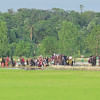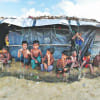Staring at a bleak future
Six-year-old Jashim sat, dressed in a grey T-shirt and trousers smeared with mud, amid piles of donated clothes strewn along the Cox's Bazar-Teknaf road. He suddenly started running after a slow moving car.
But before he could get hold of one of the packs of biscuits thrown out of the car windows, other children had grabbed them.
Jashim sat by the side of the road, panting. When offered some bread, he promptly asked, "Are you giving the cards?
"Please give me one. I did not get any."
The boy was out looking for relief since morning. His father had gone to collect relief goods as well while his mother stayed back at their tent at Palankhali camp in Ukhia, taking care of his ailing 10-month-old sister.
Jashim cannot remember the date he left his home in Rakhine State. All he remembers is his father taking them out of their house one morning after the Myanmar military attacked their village.
They trekked through the hills for days, got on a boat and crossed the Naf river to Bangladesh. "My sister fell sick on the way."
The second of four siblings, Jashim has nothing much to do in the squalid, overcrowded camp, except wander around and collect food.
"I want to study," he said, adding that he never set foot in a school as he was denied the basic right in his country that now disowns him.
The boy is among the thousands of Rohingya children facing an uncertain future. They spend their days collecting relief goods, safe water or wandering around the shelters, asking for help whenever they see outsiders.
More than half a million Rohingyas have fled Myanmar and came to Bangladesh since August 25. They had to leave behind their family members, harvest, homes, clothes, utensils and cattle.
According to a Unicef estimate, almost 60 percent of the Rohingyas who fled Myanmar are children. As of September 20, Unicef and several other humanitarian organisations have identified as many as 1,400 unaccompanied children who crossed the border alone.
Most of the children are living in harsh and insanitary conditions at the camps. Lack of safe water combined with a hot and humid weather and torrential rains is spreading waterborne diseases and infections among children.
At Balukhali camp, five-year-old Salma was playing with her younger sister Ashia in the dirt; their dresses were crumpled, untidy and smeared with mud.
The girl had just started learning Arabic at Bolly Bazar area of Maungdaw township. She too has no idea what it is like to be in a school.
She stares blankly when asked what she wanted to become. Perhaps she never thought about it. Perhaps her parents only thought about how to survive in a country that refused to acknowledge them.
"We lived in constant fear and despair. It was no life there," said her father Abul Hashem, who was a woodcutter.
"Our children did not have access to school. They mostly stayed around the homestead. Studying in a school is something unimaginable to us."
Eleven-year-old Mokabbar, however, was a bit lucky. He had gone to a school and studied up to class-II. But he dropped out five years ago when violence flared up in Myanmar.
When he was told about the 1,300 learning centres to be set up for Rohingya children by Unicef, Mokabber smiled. "I love to study."
He then joined his fellow boys wandering about Kutupalong camp.

 For all latest news, follow The Daily Star's Google News channel.
For all latest news, follow The Daily Star's Google News channel. 








Comments